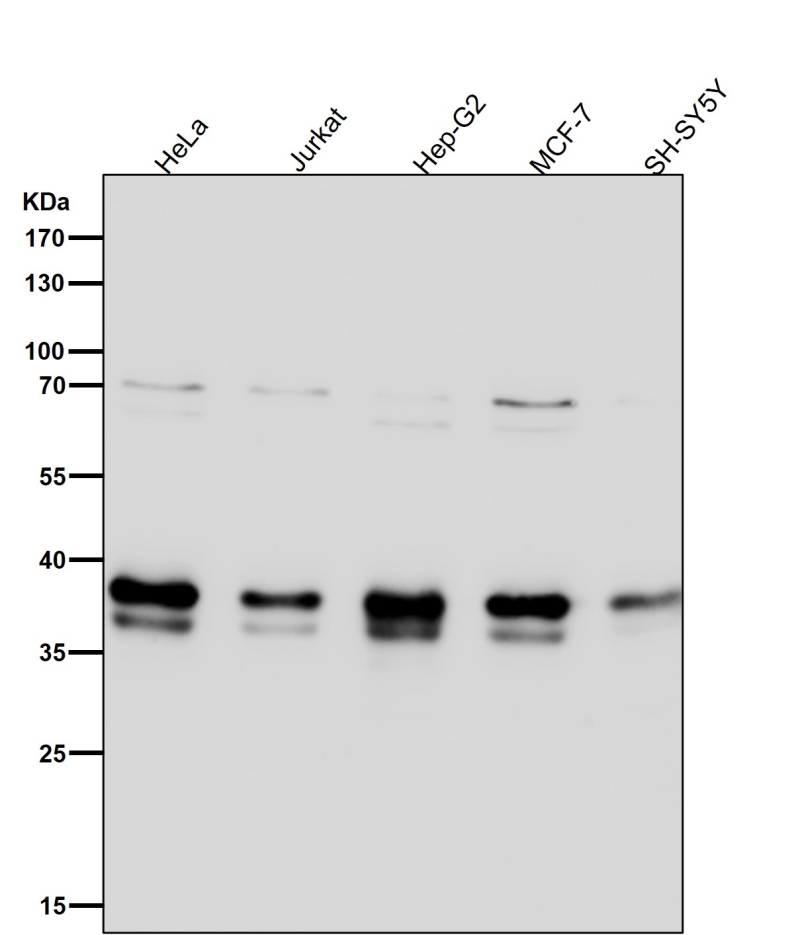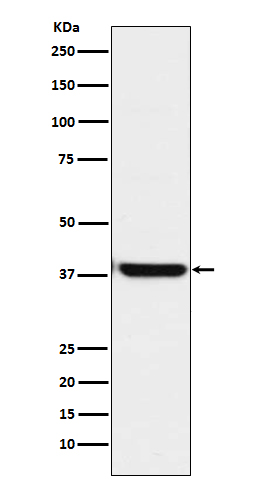


| WB | 咨询技术 | Human,Mouse,Rat |
| IF | 咨询技术 | Human,Mouse,Rat |
| IHC | 咨询技术 | Human,Mouse,Rat |
| ICC | 技术咨询 | Human,Mouse,Rat |
| FCM | 咨询技术 | Human,Mouse,Rat |
| Elisa | 咨询技术 | Human,Mouse,Rat |
| Aliases | 8 hydroxyguanine DNA glycosylase; AP lyase; HMMH; HOGG1; MMH; MUTM; N glycosylase; Ogg1; OGH 1;;OGG1 |
| WB Predicted band size | 39 kDa |
| Host/Isotype | Rabbit IgG |
| Antibody Type | Primary antibody |
| Storage | Store at 4°C short term. Aliquot and store at -20°C long term. Avoid freeze/thaw cycles. |
| Species Reactivity | Human |
| Immunogen | A synthesized peptide derived from human OGG1 |
| Formulation | Purified antibody in PBS with 0.05% sodium azide,0.05% BSA and 50% glycerol. |
+ +
以下是关于OGG1抗体的3篇参考文献的简要信息:
1. **文献名称**:*"A monoclonal antibody against human 8-oxoguanine DNA glycosylase (OGG1)"*
**作者**:Nakabeppu Y. 等人
**摘要**:该研究开发了一种特异性识别人类OGG1蛋白的单克隆抗体,验证了其在Western blot和免疫组化中的应用,证实其能有效检测细胞内OGG1的表达水平及亚细胞定位(主要定位于细胞核)。
2. **文献名称**:*"OGG1 expression and activity in Alzheimer's disease: role of oxidative DNA damage"*
**作者**:Wang J. 等
**摘要**:通过使用OGG1抗体进行免疫印迹和免疫荧光分析,研究发现阿尔茨海默病患者脑组织中OGG1表达显著降低,提示氧化DNA修复能力减弱可能与疾病进展相关。
3. **文献名称**:*"Validation of a commercial OGG1 antibody for immunohistochemical detection in formalin-fixed tissues"*
**作者**:Smith L.K. 等
**摘要**:该文献评估了某商业化OGG1抗体在福尔马林固定石蜡包埋组织中的适用性,确认其在多种癌症组织(如肺癌和乳腺癌)中可靠检测OGG1蛋白,并与氧化应激标志物呈正相关。
(注:上述文献为示例,实际引用时需根据具体文章核实作者和内容。)
The OGG1 (8-oxoguanine DNA glycosylase 1) antibody is a crucial tool for studying DNA repair mechanisms, particularly base excision repair (BER). OGG1 is a glycosylase enzyme responsible for recognizing and excising 8-oxo-7.8-dihydroguanine (8-oxoG), a common oxidative DNA lesion caused by reactive oxygen species (ROS). This lesion is highly mutagenic, as it can mispair with adenine during replication, leading to G→T transversions. OGG1 initiates BER by cleaving the glycosidic bond of 8-oxoG, leaving an abasic site for subsequent repair steps. Its role in maintaining genomic stability links it to aging, cancer, neurodegenerative diseases, and other conditions associated with oxidative stress.
OGG1 antibodies are widely used to detect and quantify OGG1 protein expression in cells and tissues, enabling research on oxidative damage responses. They are employed in techniques like Western blotting, immunohistochemistry, and immunofluorescence to assess OGG1 localization (primarily nuclear, with some mitochondrial isoforms) and expression levels under varying oxidative conditions. Commercial OGG1 antibodies are often validated using knockout cell lines or recombinant proteins to ensure specificity. Researchers also utilize these antibodies to explore OGG1's regulatory mechanisms, post-translational modifications, and interactions with other repair proteins. Understanding OGG1 dynamics through antibody-based assays contributes to insights into disease pathogenesis and potential therapeutic strategies targeting oxidative DNA damage.
×